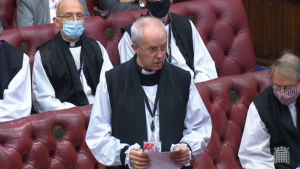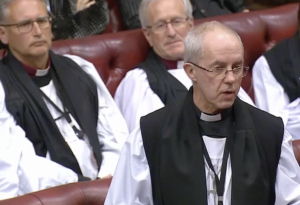Twenty-six Anglican bishops are given seats as of right in the House of Lords.
The UK is the only western democracy which reserves seats for clerics in its legislature.
This is unfair, undemocratic and undesirable. It's time to abolish the bishops' bench.
Two archbishops and 24 bishops of the Church of England currently have automatic seats in the House of Lords. They are sometimes known as 'the lords spiritual'.
We campaign for a secular upper house with no specific religious representation, whether of Christian denominations or any other faiths. In a secular state no religion or its leaders should have a privileged role in the legislature.
Any serious proposals to reform the House of Lords must address the unjustified privilege of the bishops' bench.
62% of Brits think no religious clerics should have an automatic right to seats in the House of Lords.
After over a century of decline in religious attendance in Britain, the claim that bishops — or any other religious representatives — speak for any significant constituency is not warranted. Less than 1% of the British population now attend Anglican services on the average Sunday.
In addition, the presence of religious leaders amounts to double representation of religious interests as many peers already identify themselves as being religiously motivated. Retired religious leaders are often appointed as peers.
Bishops do not have any "special moral insight" unavailable to everybody else. The idea that bishops or any other 'religious leaders' have any monopoly on issues of morality is offensive to many non-religious citizens. Those who profess no religion are no less capable of making moral and ethical judgements.
In an increasingly secular society the role of religious representatives in our legislature has become irrelevant, and has stood in the way of progressive legislation.
Take action!
1. Write to your MP
Ask your MP to help end the archaic, unfair and undemocratic bishops’ bench in the House of Lords.
2. Share your story
Tell us why you support this campaign, and how you are personally affected by the issue. You can also let us know if you would like assistance with a particular issue.
3. Join the National Secular Society
Become a member of the National Secular Society today! Together, we can separate religion and state for greater freedom and fairness.
Latest updates
Bishops’ bench rallies against Assisted Dying Bill
Posted: Tue, 26 Oct 2021 13:41
Anglican bishops in the House of Lords have united to oppose a bill to allow the choice of assisted dying for terminally ill people.
During the second reading of the Assisted Dying Bill on Friday, archbishop of Canterbury Justin Welby (pictured) said there was "unanimity" on the bishops' bench that the law on assisted dying "does not need to be changed".
The bishops' bench consists of 26 Church of England bishops, or 'Lords Spiritual', who are automatically appointed to the House of Lords.
The bill would legalise assisted dying as a choice for terminally ill, mentally competent adults in their final months of life.
The bill passed unopposed following the debate in the House of Lords but is unlikely to progress further without government support.
Religious opposition
Other members of the bishop's bench who voiced their opposition in the debate included Martin Warner, Paul Butler and James Newcome.
Warner, who is the bishop of Chichester, said "God does not inflict evil on people".
Robert Winston said the influence of bishops on the "moral compass" of the assisted dying debate is "extremely important".
Religious objections to the bill were also made by Michael Farmer, who called it "an atheists' Bill, denying God and denying eternity", and Patrick Cormack, who said the bill "does not really acknowledge the fact that many of us believe in the afterlife".
Ranbir Singh Suri equated assisted dying with suicide which he called "a crime against our maker, almighty God, and nature".
Citing Sikh religious texts, Suri said: "We have to accept the will of almighty God".
Support for the bill
Molly Meacher, who tabled the bill, said it was "overwhelmingly popular" in society and supported by 84% of the population, including 80% of people who declare themselves religious. She said this was "not surprising" because "the sole aim of this Bill is to reduce unnecessary and unbearable suffering."
Supporters also included former archbishop of Canterbury George Carey, who said: "I may be out of step with the House of Bishops, but I think it is out of step with the vast majority of our nation, including many of its own membership."
Other supporters who proclaimed Christian faith in the debate included Ruth Davidson, Sal Brinton, Nigel Vinson and Gus O'Donnell.
Several other supporters stressed the bill would not compel those with religious or other objections to assisted dying to take any part in the process.
Ann Mallalieu said: "However strong your personal view, whether based on religious belief, personal experience or strong convictions about the sanctity of human life, is it right for you as an individual to insist that your view prevails when it will prolong intolerable suffering for someone else who happens to hold a different view?"
NSS comment
National Secular Society chief executive Stephen Evans said: "This debate has again highlighted the role of religion in restricting people's freedom and choices when it comes to end-of-life decisions.
"Opposition to assisted dying is often rooted in conservative religious views. Those views should not be given undue weight in parliament. Yet this is precisely what having religious appointees in our legislature does.
"On this issue, the bishops' bench is not only out of step with the views of the general population – it is even out of step with most of its own congregation.
"It's time to end the pretence that senior Anglican clerics have some kind of special moral authority that justifies their privileged place in parliament. All the bishops' bench does is undermine democracy by promoting the narrow interests of religious elites. This debate is a good example of why scrapping the bishops' bench is long overdue."
Notes
- The United Kingdom is unique among Western democracies in giving representatives of religious groups automatic seats in its legislature. The only other country that does this is Iran.
- In September the British Medical Association, which represents about 150,000 medics, voted to adopt a position of neutrality on physician-assisted dying at its annual representative meeting.
End bishops’ automatic right to sit in Lords, says peer
Posted: Fri, 25 Jun 2021 08:36
The practice of reserving seats for 26 Church of England bishops in the House of Lords is an "absurd constitutional anomaly" which should end, a peer has argued.
Liberal Democrat peer Dick Taverne made the call in the Westminster publication The House, alongside a piece making the contrary argument from the bishop of Durham.
Taverne argued that the position of Anglican bishops "sets a bad example for democracy" and "increases the influence of the Church of England on our public affairs to a degree which is generally underestimated".
He noted that the bishops receive "special treatment" in the Lords, as they are "entitled to precedence" when they rise to speak and because every sitting is preceded by prayers.
He also said the bishops were "often out of touch with public opinion" on "important moral issues".
He cited the bishops' opposition to the legalisation of assisted dying, which polls suggest is widely supported among the British public, and support for faith schools as examples.
Bill to end bishops' right to sit in Lords
Last year Taverne introduced a bill to parliament which would end the bishops' automatic right to sit in the Lords, and which the National Secular Society helped to draft.
He also explained his case in an episode of the NSS's podcast.
NSS comment
NSS chief executive Stephen Evans welcomed Taverne's intervention.
"The anachronistic bishops' bench grants the Church of England a privileged position to advance its own interests in parliament. It's absurd that any clerics are given a lawmaking role solely by virtue of their position in the hierarchy of one particular church.
"This archaic arrangement enables a church that has seen unrelenting decline in affiliation for decades to maintain undue influence over our national affairs.
"Ending the bishops' automatic right to sit in parliament would be a welcome step for equality, fairness and democracy."
Polls suggest public support for change
In March 53% of respondents to a YouGov poll said the Lords should not continue to have places for C of E bishops, while just 16% said it should.
In response to another YouGov poll for The Times in 2017, 62% said no religious clerics should have "an automatic right to seats". Only 8% said the bishops should retain their seats.
Dick Taverne and the bishop of Durham's articles are available on The House section of the PoliticsHome website.




